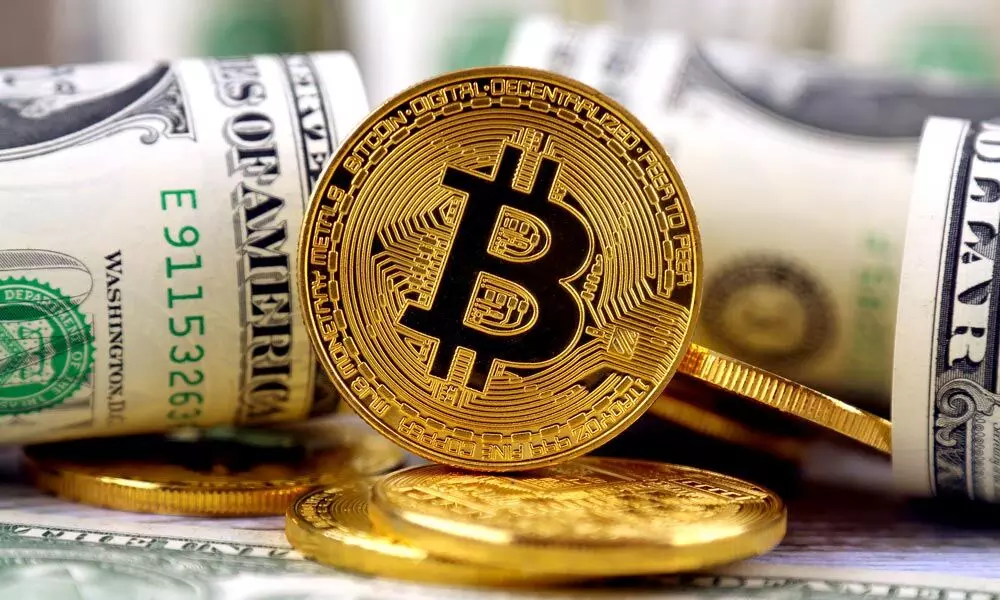Rise of cryptos opens doors of financial freedom
The world of cybercurrency is no longer just for geeks. Artists, Wall Street traders, and those who want to retire early might be able to thrive there, too. But beware!
image for illustrative purpose

Who doesn't want financial freedom? Day jobs can strain your back and put stress on your mental health. Some of us sigh at the prospect of returning to the office and enduring long commutes. The dramatic rise of cryptocurrency has opened opportunities for some to leave the corporate world. A senior executive at Goldman Sachs Group Inc, whose total compensation might well have exceeded $1 million a year, recently quit. He reportedly cashed in at least $14 million worth of cryptocurrency and is said to be setting up his own hedge fund.
Cryptos are not for the faint of heart. And they've been on a wild ride lately. Retail buying in Bitcoin seems stable at close to 200,000 tokens per quarter, according to an estimate by JPMorgan Chase & Co. But inflows from institutional investors, who have been late to the game, slowed considerably in the first quarter and have turned negative since April. The professional money is shifting back to gold. That's put in doubt the prospect of wider adoption - and thus stability.
So, is there still a case for allocating some of your wealth to crypto, or even giving up your job for a place in the expanding crypto universe?
If you're a professional money manager, crypto would produce the kind of volatility you'd have to explain to risk-averse clients on an almost daily basis. But it's a different playbook if you are an individual investor: It's your own money you're risking.
If, as some believe, Bitcoin is worth as much as the private sector holdings of gold - around $2.7 trillion - the theoretical price of a single Bitcoin should be $140,000, according to JPMorgan. However, since Bitcoin is about four times as volatile, the bank estimates its fair value would be just $35,000. It's that risk premium - as manifest in the wild price swings - that keeps Bitcoin at about $34,000 right now.
Thus, if you, as a private investor, have the financial ability to ride through Bitcoin's wild cycles - and frequent ugly nosedives - and wait for your crypto asset to mature and behave better, you could come out nicely, though perhaps decades later. By this logic, it's not unreasonable to allocate a few percentage points of your portfolio to crypto.
Beyond investing, what about making a living in the crypto wild west? There's some early evidence you don't need to be a computer science geek to survive there.
The crypto world can be rewarding for digital artists who produce NFTs - non-fungible tokens or irreplicable, blockchain-recorded entities. For example, SuperRare, an auction site, takes only a 15 per cent commission of such sales, much lower than the 50 per cent galleries typically charge. In addition, because of blockchain's accounting capacity, crypto artists automatically get a 10 per cent cut each time an owner resells their work, something unheard-of in the traditional art world, the New York Times reported.
Similarly, some Wall Street bankers, who spent decades in trading and market-making, are now building a second career deploying the same tried-and-tested strategies - price arbitrage, futures trading, options writing - dealing in cryptocurrencies, according to Bloomberg News. They're tired of seeing their returns reduced by low interest rates, regulations or some other company's higher-speed computers.
It's easy to credit the Federal Reserve's quantitative easing for financing crypto's wild swings. Since last May, US money supply consistently grew by more than 20 per cent year-on-year, well above the single-digit range witnessed after the collapse of Lehman Brothers Holdings Inc. But perhaps, the Covid-19 pandemic too has convinced people that there is more to life and career than being diligent worker bees - and that crypto may be a way to escape the hive.
Of course, a person's crypto exposure must be tailored to her own needs and disposition. Not all of us have the skill sets, fortitude or the right timing for the adventure. Young artists living on their grandparents' couches might be in great position to go all out - at least for a while. The rest of us have to consider how much capital gains tax we'd pay if we sell within a year. In some extreme cases, crypto might even affect a couple's divorce settlement.
Doing it full-time can be full of daunting choices. There are venture capital funds that help launch newly issued tokens, and funds that focus on DeFi, or decentralized finance, that allow users to trade without having a regulated exchange ever disappointing them with system delays and outages. Along the way though, you need to make sure your DeFi venture doesn't somehow cross paths with criminals.
There's a steep learning curve. The crypto world is becoming a complex financial system and you must also be able to withstand 30 per cent intra-day whipsaws. To win, you have to do a lot of homework. For now, it won't be as simple as coming home from the gym, sitting on the couch and trading with a beer in hand. (Bloomberg)

